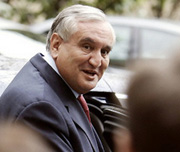|
 |
| French Prime Minister Jean-Pierre Raffarin
leaves the Hotel Matignon. (AFP) |
Jean-Pierre Raffarin, the long-suffering prime
minister who was expected to bow
out
after the EU referendum debacle, served three years in
the worst job in French politics and saw his ratings plummet to the lowest
in the country's modern history.
Appointed in May 2002, his first words of advice came from another
former prime minister of the centre-right Raymond Barre, who said his role
was to "durer et endurer" -- stick it out and soak it up.
With good humour and broad shoulders, this is what
Raffarin loyally did -- absorbing attacks more properly directed at his
master President Jacques Chirac until his authority all but ebbed away
. Like all French
prime ministers he was ready to be discarded.
Raffarin, 56, can claim several important
successes during his tenure. In 2003 he oversaw changes of the pensions
and health insurance systems which were radical by French standards and
triggered widespread opposition from trade unions and the left. He also
pushed through a new decentralisation
programme.
But heavy defeats for the ruling Union for a
Popular Movement (UMP) party at regional and European elections last year
prompted Chirac to order a slowdown of controversial reforms and a switch
to a more "social" domestic agenda. Raffarin survived a reshuffle
but his powers were
circumscribed.
Squeezed between more ambitious players such as Interior Minister
Dominique de Villepin, Social Affairs Minister Jean-Louis Borloo and
ruling party chief Nicolas Sarkozy, Raffarin was clearly on borrowed time.
As a new wave of social protests broke out earlier
this year, the prime minister's popularity took a nosedive
-- falling even further as the "no"
camp took the lead in the campaign on the EU constitution.
A well-intentioned initiative to abolish an annual bank holiday in
order to raise money for the elderly backfired two weeks ago when the vast
majority of the public said they preferred to keep the day off. At that
point his disapproval rating -- 76 percent -- was the highest in the Fifth
Republic.
Born in 1948 into a prosperous family in the central city of Poitiers,
Raffarin distinguished himself by being one of the few French leaders to
have first pursued a career in the private sector. He was a coffee
salesman in the 1970s, and later head of a communications agency.
He began his political career as a supporter of president Valery
Giscard d'Estaing and later was vice-president of Liberal Democracy -- a
pro-market party that joined Chirac's UMP. He was a senator for his home
region of Poitou and joined Chirac's first government in 1995 as minister
for small business.
After Chirac's election victory in 2002 over far-right leader
Jean-Marie Le Pen, Raffarin was chosen as prime minister because of his
reputation as an unassuming provincial. It was Raffarin who coined the
phrase "la France d'en-bas" - the ordinary people down below -- with whom
he identified.
Fully aware that he was not marked out for greatness, Raffarin never
lost his sense of proportion -- even when vilified by street demonstrators
and the left-wing press. He told interviewers he would happily return to a
less exalted existence once his duties as Chirac's punching-bag were over.
(Agencies) | 